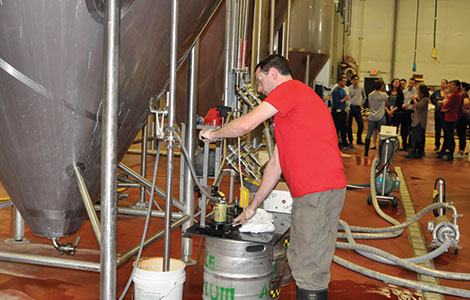New beer brewing certificate available

Joe Waltz checks quality control at Ale Ayslum. He also teaches the practicum brewing courses for Madison College.
April 8, 2015
If you’ve ever been inside of a brewery, you would know that there’s more to beer than what meets the palate! Appreciation for the complex brewing process has held a steady growth into mainstream culture. Culture isn’t just referring to the main ingredient necessary in the production of beer, but also the rising industry behind it.
Now, Madison College has an exciting course to offer beer enthusiasts, novice home brewers, and potential, future brew-masters. The Craft Brewing Certification, a three-part course, involves everything from the basics to the complex processes entailed with the making of beer. However, the classes are available to anyone interested, not just to those pursuing the certificate. Students must be 21 to enroll.
Each section of the course is taught by different professionals, having numerous years’ experience within the industry with intent to pass down their wisdom and knowledge to the future generations of yeast ranchers.
“I want students to be able to deconstruct a beer; not only using classification tools like SRM, ABV and relative bitterness, but also by properly tasting,” states Daniel Ross, instructor of the first section, Beer Brewing and Serving Essentials.
Ross is currently one of the front-of-house managers, an investor, and a tour guide at local brewery Ale Asylum. After 14 years working in multiple craft bars, he was hired on five years ago and has since gained experience with in the technical sides of the brewing process and packaging, as well as developed an in depth philosophy of the social occasions behind the expanding industry. “Talking about great beer with great people, this is true craft beer culture.”
Beer Brewing and Serving Essentials runs once a week for 8 weeks, 3 hours a class period. Students can expect to learn about the historical importance of beer and the rise of the craft movement; the brew process, ingredients, and equipment; as well as, detailed classifications and deconstruction of styles, and concepts for food pairings.
Ross tells students, “My particular section requires only the student bring a discerning palate. I will provide an abundance of growlers, taster glasses, and the opportunity for copious note taking.”
If the first section isn’t enough to entice your taste buds, the next two classes within the Certificate course deal with even more exciting opportunities such as practical, hands-on brewing, to meticulous procedures of fermentation.
The second course offered in this new program is titled Beer Brewing Science: Microbiology & Fermentation. This class will discuss detailed processes in fermentation, biology and chemistry of yeast malting processes, and beer flavoring, bittering, and maturation. With an emphasis on technical fermenting elements and sanitation maintenances, students can expect to delve deep into the brew process and emerge on the other side with an extensive understanding imperative for a future in the craft industry. It runs simultaneously with the first class, for 8 weeks.
Joe Waltz, current lead yeast and brewing analysis at Ale Asylum, teaches the third and final component, Brewing Practicum: Hands-on Brewing Production and Evaluation. Waltz’s experience has taken him from keg washing and packaging, to head brewing, in addition to over twelve years experience with home brewing.
“Students would probably feel cheated if they sign up for a college-level brewing class and are simply taught the basics of home brewing – especially since many of them are already home brewers,” asserts Joe, when asked about the material he hopes to cover.
“I hope to eliminate that issue by covering a lot of nerdy topics that many professional brewers don’t even consider, and presenting them in a way that makes them easy for students to incorporate in their brewing processes. Topics will include water chemistry, the dependency of brewhouse efficiency on runoff gravity, adjusting hop calculations for alpha acid saturation, achieving proper yeast pitch rates, controlling fermentation temperatures, and calculating natural carbonation from vessel volumes instead of beer volumes.”
Waltz hopes to infuse the students with groundwork for continued learning. “Students can expect to retain more information than a standard lecture because of the work they’ll perform with their hands.”
What work may that be? Priceless hands-on brewing experience, of course! Brewing Practicum will be held four Saturdays in May, with additional sessions in July and August.
“There’s a lot of competition for entry level brewing jobs and employers will expect applicants to have fundamental knowledge on how beer is made,” Joe Waltz declares. “This course will provide that.”
Both of the first two courses are currently wait-listed, but well worth being patient! It can prepare students for the Cicerone and Beer Judge Certificate, prepare future entry level brewers, and demonstrate knowledge and passion for beer, which are crucial aspects within the industry.
So, if the intricacies of beer and brewing has ever been a curiosity, whether to pursue a future profession or just as a beer enthusiast, this certification is exactly what you have been waiting for.




























